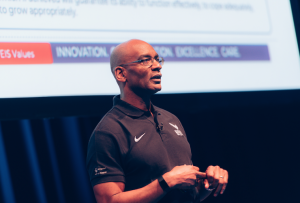‘No silver bullet’ to increase diversity in sport, says EIS Director Walker
Nigel Walker OBE has said there is ‘no silver bullet’ that will increase diversity in sports administration and leadership, but by working together as a system, opportunities could be increased for underrepresented groups.
The National Director of the English Institute of Sport (EIS) was speaking at Westminster Insight’s Diversity and Inclusion in Sport Digital Conference alongside speakers such as Alison McGovern, Shadow Minister for Culture and Sport and the Football Association’s Equality, Diversity and Inclusion Director, Edleen John.

Former international athlete and rugby union player Walker acknowledged that there was a long way to go, with 64% of funded sports bodies having no Board members from ethnically diverse backgrounds* and highlighted that identifying the areas of greatest need and getting the basics right was fundamental.
One of the key areas for the EIS is recruitment and Walker explained some of the steps being taken to widen the applicant pool and ensure the right opportunities were reaching the right people.
“We have no difficulty attracting people to work in the EIS, but we have traditionally had insufficient diversity of backgrounds and experience in our applicants, meaning we miss out on new perspectives, different approaches, greater creativity and innovation.
“We have undertaken an end-to-end review of our recruitment training, processes and policies to mitigate bias and remove barriers for underrepresented groups. We have also appointed a lead role, shared with UK Sport, to drive this area forwards and I’m delighted with the progress being made so far.”
Trixie Marchant, who was appointed Diversity and Inclusion Manager at UK Sport and the EIS in 2020 to accelerate the Equality, Diversity and Inclusion agendas in both organisations, added:
“In a relatively short space of time, we have started to make some really significant advances in the area of recruitment. All of our roles now offer flexible working and, in most cases, remote-working too; we are reaching out specifically to candidates with ethnically diverse backgrounds, those with disabilities and career returners and we are using non-gendered language in our job descriptions.
“We are also planning a number of targeted positive action initiatives, such as outreach, mentoring, sponsorship and apprenticeships, to attract, retain and develop underrepresented people in the sports sector.”
Walker also referenced the implementation of the Code for Sports Governance and existing programmes such as UK Sport’s Leadership Programme and Female Coaches Leadership Programme as ways the system was already making positive change.
“A lot of excellent work is taking place across the high performance system but it will take a continued, joint effort for us to bring about real change in the long term,” Walker concluded.
*Inclusive Boards Diversity in Sports Governance annual survey 2018/19